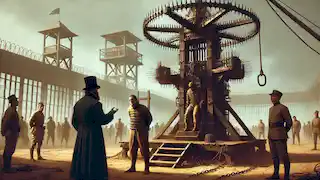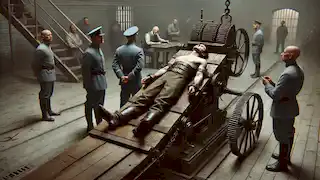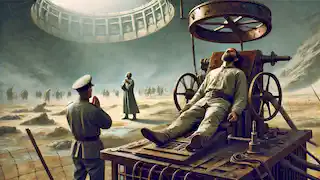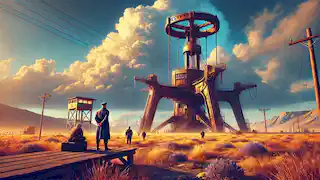The traveler, who had been invited to attend the execution in the penal colony, was gazing at the peculiar apparatus with an air of detached curiosity. It was an elaborate device designed to carry out executions in a unique way, developed by the former Commandant, who ruled the colony with an iron fist. The machine itself was composed of several parts: a bed, a harrow, and a strange contraption that seemed to hold a needle-like instrument. It was an innovation of brutality, one that, despite its grim purpose, had been treated with reverence by the Officer in charge.
“It’s a remarkable piece of work,” the Officer remarked, barely concealing his excitement as he looked upon the machine with an almost childlike glee. He was the machine’s steward, its operator, and its most fervent admirer. “You will understand its beauty when you see it in action,” he continued, eager to share the mechanics of the device with the traveler.
The traveler, feeling uneasy, refrained from responding immediately. The heat of the day pressed down on him, the oppressive atmosphere of the penal colony gnawing at his sense of decency. In this remote, barren land, justice had taken a strange and terrifying form, one that seemed to defy all sense of reason.
“Would you care for a demonstration?” the Officer asked, his voice brimming with anticipation.
The traveler shook his head slightly, unsure how to respond. “I’ve never witnessed an execution quite like this,” he finally said, trying to remain polite despite the mounting unease in his chest.
The Officer grinned and motioned toward the condemned man who stood nearby, shackled and mute, awaiting his fate. He was a prisoner, convicted of an unspecified crime, a mere cog in the machinery of colonial justice.
“You see,” the Officer began, his voice taking on the tone of a lecture, “the condemned does not know his sentence until it is carved into his flesh by the harrow.”

The traveler looked at the condemned man with growing horror. He was stripped of his dignity, a mere object for this horrific demonstration. The harrow, a metal frame with sharp points, would inscribe the law he had broken into his skin, one painful letter at a time. The man would suffer in ignorance, only learning the nature of his crime through the slow, agonizing process of being marked by the machine.
“The process takes about twelve hours,” the Officer continued, undeterred by the traveler’s discomfort. “The condemned experiences a moment of enlightenment toward the end, just before he dies. It is in that moment that he understands his crime and the justice of his punishment.”
The traveler could hardly believe what he was hearing. The Officer spoke with such devotion to the machine, as if it were a sacred object. The method of execution was barbaric, cruel, and devoid of any moral foundation. Yet, here in this forgotten colony, it was hailed as a triumph of justice.
“Does the condemned ever object?” the traveler asked, though he already suspected the answer.
The Officer smiled again, shaking his head. “No, they don’t. They are usually silent. They know that the old Commandant’s system is just. The machine speaks for itself.”
The traveler cast his eyes downward, overwhelmed by the surreal nature of the situation. He had come to the penal colony out of curiosity, but what he had found was a perverse ritual that turned human suffering into spectacle.
As the Officer prepared the machine for the execution, the traveler couldn’t shake the sense of dread that had settled over him. The condemned man stood passively, as though resigned to his fate, without protest or plea for mercy. His silence was more disturbing than any words of defiance might have been. The traveler felt a growing sense of responsibility, but what could he do in a place so far removed from civilization?
“The former Commandant was revered for his system,” the Officer said, his voice reverent. “He knew how to maintain order in the colony. This machine was his greatest achievement.”
“And now?” the traveler asked, trying to keep his voice steady.
“Now, the new Commandant doesn’t appreciate the machine,” the Officer said, his face darkening. “He tolerates it because of tradition, but I fear he will do away with it soon. That’s why I am so eager for you to witness this execution. You can help spread the word of its importance.”
The traveler, feeling trapped, realized he had no intention of endorsing such a barbaric practice. But how could he refuse without offending the Officer, who was clearly a fanatic?
“You are an influential man,” the Officer continued. “Your opinion could sway many. You could help preserve the legacy of the former Commandant.”
The traveler didn’t respond. He was torn between the desire to stop the execution and the knowledge that he had no real authority in the colony.
As the machine began its work, the traveler watched in horrified silence. The harrow descended onto the condemned man’s body, slowly and methodically etching the sentence into his flesh. The man’s face contorted with pain, but he made no sound. The Officer stood nearby, watching the process with rapt attention, as though he were witnessing a divine ritual.

The traveler could hardly bear to watch, but he felt compelled to see it through. He had to understand the full extent of this cruelty, to bear witness to the inhumanity of the system. The condemned man’s body trembled as the harrow dug deeper, but still, he remained silent. The Officer’s eyes gleamed with pride as the machine carried out its grisly task.
“The enlightenment will come soon,” the Officer whispered, as though speaking to himself.
The traveler, sickened by the sight, turned away. He couldn’t stand it any longer. He wanted to leave, to escape the oppressive atmosphere of the penal colony, but something held him back. Perhaps it was the thought of the condemned man, suffering in silence, or perhaps it was the Officer’s fanatical devotion to the machine. Whatever it was, the traveler felt a sense of responsibility to see the process through to its end.
As the hours passed, the traveler’s sense of unease grew. The condemned man’s body was now covered in blood, his skin marked by the sharp points of the harrow. Yet, he remained conscious, though barely. The Officer, undeterred, continued to watch the process with a kind of religious fervor.
At last, the moment of enlightenment arrived. The condemned man’s eyes fluttered open, and for a brief moment, he seemed to understand. There was a flicker of recognition in his eyes, a look that suggested he finally grasped the nature of his crime and the justice of his punishment. But it was fleeting. In the next instant, his body went limp, and he was dead.
The Officer stepped forward, his face glowing with satisfaction. “Do you see?” he asked, turning to the traveler. “He understood. In his final moments, he understood.”
The traveler said nothing. He was too disturbed by what he had witnessed. The machine, this horrific device, had claimed another victim, but at what cost? The man had been subjected to unspeakable pain, only to die in the end. What kind of justice was this?
The Officer, oblivious to the traveler’s inner turmoil, began to prepare the machine for its next use. But the traveler had seen enough. He could no longer remain silent.
“This must end,” he said quietly, his voice firm.
The Officer looked at him in surprise. “End? But you’ve just seen its beauty! You’ve witnessed the justice of the former Commandant’s system!”
“No,” the traveler said, shaking his head. “This is not justice. It’s cruelty.”
The Officer’s face darkened. “You don’t understand. The machine is perfect. It ensures that the condemned understand their crimes. It brings order to the colony.”
The traveler stood his ground. “This machine is a relic of a barbaric system. It has no place in the modern world.”
The Officer stared at him, his eyes filled with disbelief. “You’re wrong,” he said, his voice shaking. “You don’t see the truth. The machine is justice.”
But the traveler had made up his mind. He would not be a party to this cruelty any longer.
As the traveler left the penal colony, he felt a strange mixture of relief and guilt. He had done what he could to speak out against the barbaric practice, but he knew that the Officer would continue to operate the machine as long as he had the power to do so.
The colony itself seemed to mirror the fate of the condemned. It was a place of suffering, of pain, and of a justice system that had lost its way. The traveler couldn’t help but feel that the entire system was doomed, much like the machine itself.
In the end, the traveler knew that he could not change the world on his own. But he could refuse to be a part of it.
{{{_03}}}
With that thought, he boarded the boat that would take him away from the penal colony and back to civilization. But the memory of what he had witnessed would haunt him for the rest of his life.
The new Commandant, aware of the discontent among some of the colonists, eventually did away with the machine. The Officer, however, remained loyal to the memory of the
former Commandant. Unable to accept the changes, he decided to undergo the machine’s final operation himself.

In the dead of night, with no witnesses, the Officer lay down on the bed of the machine, set the harrow to work, and awaited his own moment of enlightenment. But the machine, now old and poorly maintained, malfunctioned. Instead of delivering the slow, deliberate justice that the Officer revered, it tore him apart in a gruesome, chaotic death.
The traveler, who had long since left the colony, never learned of the Officer’s fate. But the penal colony itself eventually fell into ruin, its cruel justice system forgotten by the world.


















